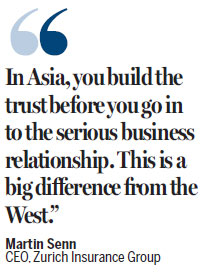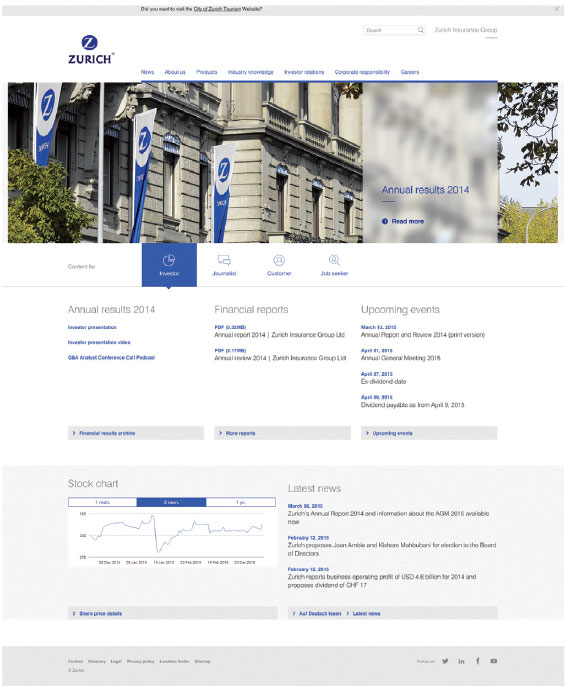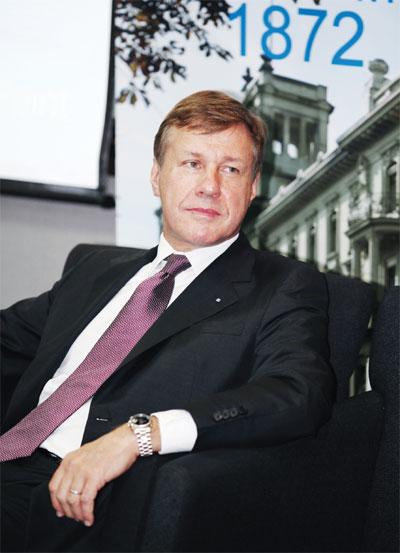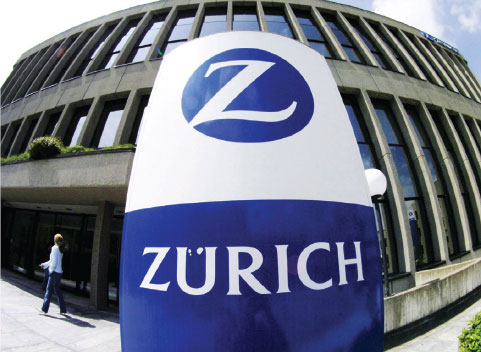East meets West to spell success
Updated: 2015-03-16 07:36
By Hu Yuanyuan(HK Edition)
|
|||||||||
The veteran banker leading Zurich Insurance gives credit to his belief in personal contact and natural Swiss neutrality. Hu Yuanyuan reports.
Martin Senn, CEO of Zurich Insurance Group, has been lucky enough to gain deep insights about Western notions of capital and Eastern notions of Zen, and is wise enough to serve both.
Starting off as a banker in the former Swiss Bank Corporation in the late 1970s, Senn learned about capital in the US, and imbibed skills in Zen, refined relationships and interactions through his experience in Asia.
He joined Zurich Insurance, then called Zurich Financial Services, in 2006, and was appointed to his current position in 2010, in part due to his management of the company's investment during the 2008 global financial crisis.
Under his leadership, Zurich weathered that crisis well, protecting its strong capital position while countering slower growth in mature markets by seeking out opportunities in its priority developing markets.
"For better or for worse, the past 25 years have been characterized by a great opening up of our global economy. We are truly a 24/7 world," Senn has said.
"Governments and businesses didn't manage the risks of that liberalization perfectly, but we must stay the course, improve our understanding and management of these interconnected global risks, and keep finding new ways to build global consensus and cooperation, always be patient and neutral, a core of Zen, an ancient Chinese wisdom."
Asian adventure
Senn, now 57, first landed in the Eastern hemisphere in 1983, at the young age of 26. That was when, following company-funded training in the US, he was promoted to treasurer in Hong Kong for the Swiss Bank Corporation. It was a game changer for his career and life.
"After I moved to Hong Kong, my boss asked me what I had learned during my training in the US. I told him I learned that money was important," said Senn.
"He asked me to hold a coin close to my eyes, and all I could see was money. Then he told me to hold the coin further, and suddenly I could see many things beyond the money, the people, the office, and the scenery outside the window."
It did not take long for him to realize that one of the most important elements in the landscape of money is relationships.
In Hong Kong, he took up the responsibility of managing not only the business but also people, and of holding talks with mainland government agencies on how to manage foreign exchange and how his bank could help.
At work he started to meet a lot of people from local banks, companies, and regulators. But instead of limiting his contacts to formal occasions, he established a firmer network by acting as a sincere and efficient "fax-er."
"One time, I returned to Hong Kong from a meeting in Beijing, and the company asked me to send a fax to confirm what we discussed. I tried for two or three days to send the faxes but they would never go through because the fax machine was always busy. They only had one fax machine for the whole ministry," Senn said.
"My boss then told me to take the fax, in person, to Beijing."
It then became his bitter-sweet job to go back and forth between Hong Kong and Beijing nearly every week for six months.
"With that I got to know everybody, from the security guards, receptionist and the secretary, to the assistant, all the way through to the governor," he said.
"That period in Hong Kong was a very important part of my development because, for the first time, I became a treasurer of the bank and I also had to develop this network of people from different cultures."
That experience taught Senn a lesson about personal interaction - a lesson of relishing personal contacts in the age of faxes, e-mails, or whatever communication technology that may follow.
"In Asia, you build the trust before you go in to the serious business relationship. This is a big difference from the West," Senn said.
"In Europe and the US, people are very transaction-oriented. You do a transaction and you trust that there is an environment that enables that in an easy way. However, the culture in Asia also creates its very unique environment and game rules: Sometimes, the efficiency is higher than the transaction way, both are amazing."
Ties that bind
In Hong Kong, he recognized the profound importance of family ties in Asia, and it was here that he met his future wife, a South Korean violinist.
She gave him more lessons about Asia and his best memory of it. "I remember it very well. It was 1983 and Swiss National Day, Aug 1. We were celebrating a business event on a boat in the South China Sea. My wife was a guest and she told me she was Korean. I asked her North or South? She thought that was a stupid question," Senn said.
"I married her in 1985. It is my best memory, meeting her in Asia."
His wife opened Senn up to a new realm of culture and gave him an expanded and personal perspective on society. That helped him develop stronger ties with the Asian market. For much of the following two decades, Senn was committed to developing business in Asia.
Before joining Zurich Insurance Group in 2006 as chief investment officer and becoming group CEO in 2010, Senn worked in Hong Kong, Singapore and Tokyo for the Swiss Bank Corporation and later joined Credit Suisse where he was in charge of restructuring and repositioning all legal entities of the group in Japan.
Zurich was the first continental European insurer to set up a representative office on the mainland and, in 2006, became the first foreign insurer to be granted a license to establish a general insurance branch in Beijing.
The mainland market has always been one of the focuses of Senn's agenda, and once again that focus started with something personal.
He visited Shanghai for the first time in 1984, accompanying his then girlfriend on a music tour, and was greatly impressed by the good manners of Shanghai residents in this "kingdom of a million bicycles".
He found people who were unable to get, or could not afford, the tickets had stopped outside the studio with their bikes, listening attentively and quietly to the music.
"They all loved music so much even though people were not rich at the time. Foreigners were rare in the city back then, and when people saw me they thought I was the composer or some musician. They were eager to get my signature," said Senn.
"Today things are so different. Shanghai has already become an international city, with bikes giving way to modern cars on the wide roads."
Senn is grateful that the company has been helping, and benefiting from, the modernization of the mainland and the evolution of the mainland insurance sector.
In 2000, Zurich bought a stake in New China Life Insurance (NCL) and gradually increased its holdings to the regulatory ceiling of 20 percent as part of the group's ambition to expand its presence on the mainland. The European insurer had been helping NCL and its other shareholders to grow the business by sharing insurance expertise ever since and also supported NCL in its 2011 initial public offering (IPO).
Zurich finally sold all its shares in NCL in 2013 when the business link evolved from a strategic partnership to a financial investment.
Senn calls the deal a "win-win-win story" for the mainland, shareholders of NCL and Zurich itself.
"The company had grown so big with a continued need for cash injections. We had to make a decision about whether we wanted to keep it as a financial investment or at one point sell it," he said. "We are very pleased to have supported the company in getting fit for an IPO. In an agreement with New China Life's other shareholders and with the consent of the mainland authorities, we decided to sell our remaining stake."
But Zurich's investment in the mainland scene did not stop with that withdrawal.
Since 2010, Zurich has invested in Shanghai to set up and maintain the Zurich International Research and Development Centre of Shipping and Finance, with the goal of supporting Shanghai's ambition to become an international shipping and finance center by 2020.
Results from research done by the center and presented to central government officials have won positive comments.
As for Senn, he has continued to live by his belief in personal contact and trust since he became CEO of Zurich. He participated in the opening ceremony of the center in 2010 and has since visited the mainland a few times to hold talks with government officials, regulators, and business partners.
In October 2013, he met with President Xi Jinping, Secretary of the Central Commission for Discipline Inspection Wang Qishan, and former Premier Zhu Rongji on topics concerning foreign companies' development in the mainland.
"Switzerland is a neutral country. So it's kind of in my veins to be neutral and to accept all different parties and work as partners," Senn said.
"This is also a very key point mentioned by the ancient philosopher, Laozi. The mainland has a competitive environment, obviously still restricted in some aspects. But frankly we have to accept that. I think the government has to continue along the path it has been following and pursue a gradual opening in a controllable manner."
Operating in a challenging and dynamic market, Zurich Insurance managed to secure fast and innovative development with support from Senn's headquarters and the global network.
In 2013, Zurich was ranked the sixth-largest foreign non-life insurer in the country despite having just one branch in Beijing, with gross written premiums of 496 million yuan ($80 million). Business with local companies jumped 16.6 percent from the previous year.
Karen Hu, CEO of Zurich China, joined the company in 2009. A veteran of mainland's insurance market, where she started her career in 1980, she helped her previous company get the first foreign insurance license in 1992 in Shanghai, ten years before China joined the World Trade Organization. Karen also witnessed the entry of foreign insurers into the mainland market.
In April 2013, the Beijing Branch of Zurich Insurance Company was converted into Zurich General Insurance Company (China) Limited under approval of the China Insurance Regulatory Commission (CIRC). The move lifted business restrictions concerning expansion, also a very important milestone for Zurich on the mainland.
The Shanghai Branch started operations in 2014. Besides deepening business commitment, Senn has also encouraged the mainland subsidiary to adopt Zurich's global commitment to corporate social responsibilities and nurture local talent.
Giving something back
Zurich has helped fight poverty and support education in underprivileged areas such as Hebei, Gansu, Sichuan, and Zhejiang provinces, winning extensive social and government recognition.
Every time Senn visits the mainland, he meets with new and highly placed potential employees as well as company leaders to discuss business professionally.
"Zurich is not aiming for the biggest but for the best," Senn said. "By best I mean meeting continuous business growth as well as social responsibilities."
Looking forward, Senn said the mainland industry offers Zurich and other market players huge opportunities, compared with developed countries where insurance penetration is already in the double digits.
In August last year, the mainland insurance regulator released an industry blueprint that envisions insurance premiums will amount to 5 percent of the country's GDP by 2020, up from the current level of 3 percent. Considering mainland's annual GDP is growing at about 7 percent, premium revenue will have to be more than doubled in the next five years to meet the target set by the blueprint.
"As the country gets richer, they will have more to lose, and with that, you will need more insurance," Senn said.
"The mainland's insurance penetration is already high, but as it continues growing and industrializing, insurance penetration will of course increase. Zurich has the passion and confidence to join the construction of China's insurance market, under the leadership of CIRC and with commitments by all other insurers."
When he talked about this with us in the capital last October, the brilliant autumn of Beijing was bringing the country not only blue skies and floating clouds, but also the happiness of harvest, payoff for the patience and hard work over the years.
Contact the writer at huyuanyuan@chinadaily.com.cn

|
The mainland insurance industry offers Zurich and other market players huge opportunities compared with developed nations where insurance penetration is already in the double digits. Photos Provided to China Daily |
|
Zurich, the first insurer from the European continent to set up a representative office on the Chinese mainland, was the first foreign insurer granted a license to establish a general insurance branch in Beijing. |

(HK Edition 03/16/2015 page9)

